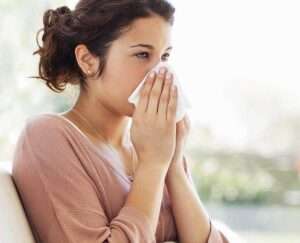Cough and Cold

Cough and cold are commonplace ailments that impact individuals worldwide. In the world of Ayurveda, an ancient holistic healing system, these respiratory issues are viewed through a unique lens. Let’s unravel the intricacies of Ayurvedic perceptions of cough and cold, exploring remedies, preventive measures, and the integration of traditional and modern approaches.
I. Introduction
In Ayurveda, the terms “Kasa” and “Pratishyaya” represent cough and cold, respectively. Understanding these conditions requires delving into the Ayurvedic framework of health.
Ayurveda recognizes the widespread prevalence of cough and cold, acknowledging their impact on physical, mental, and spiritual well-being.
II. Ayurvedic Understanding
A. Tridosha Concept
Ayurveda operates on the tridosha theory, categorizing individuals into Vata, Pitta, and Kapha doshas. Imbalances in these doshas can contribute to respiratory issues.
In Ayurved, it is told that we get energy through Praan (air which we inhale inside). This Praan vayu is dry in nature. But everything in body is oily or wet (except Vaat dosha). So for reducing dryness of praan vayu, our body keeps Kapha dosha in respiratory system (i.e. Chest). This kapha dosha can be seen in form of mucosa. Oiliness of Kapha dosha reduces dryness and make praan vayu more comfortable to take inside of our body. We need Kapha dosha in proper quality and quantity for better functioning of respiratory system.
But in some condition, this kapha dosha level increases than normal and then it leads to various disorders. like cold if kapha increases in upper respiratory tract, cough if kapha increases in middle respiratory tract and asthma if kapha increases in lower respiratory tract.
Maintaining harmony among the doshas is crucial for overall health, and disruptions can manifest as cough and cold symptoms.
III. Causes According to Ayurveda
A. External Factors
According to Ayurveda, cough and cold are often influenced by external factors that disturb the balance of doshas (Vata, Pitta, Kapha) in the body. Here are some external factors, as per Ayurveda, that can contribute to cough and cold:
- Seasonal Changes: – Ayurveda acknowledges the impact of seasonal variations on health. The transition between seasons, especially from late fall to early winter and from winter to spring, is considered a vulnerable period for respiratory imbalances.
- Cold and Damp Environments: – Exposure to cold and damp environments, particularly in winter or rainy seasons, can aggravate Kapha dosha and contribute to respiratory congestion.
- Inappropriate Diet: – Consuming foods that are cold, heavy, and excessively sweet or dairy-rich can imbalance Kapha dosha, leading to mucus accumulation and respiratory issues.
- Excessive Physical Exertion: – Overexertion, especially in cold or windy conditions, can disturb Vata dosha and weaken the immune system, making an individual more susceptible to respiratory infections.
- Inhalation of Dust and Allergens: – Exposure to airborne particles, dust, and allergens can irritate the respiratory passages, leading to increased vulnerability to cough and cold.
- Poor Sleep Patterns: – Irregular sleep or inadequate rest can weaken the immune system, making the body more susceptible to infections, including respiratory issues.
- Exposure to Wind: – Excessive exposure to cold and dry winds can aggravate Vata dosha, leading to dryness in the respiratory passages and increased susceptibility to cough.
B. Internal Factors
Internal factors in Ayurveda that contribute to cough and cold are related to imbalances in the doshas (Vata, Pitta, Kapha) within the body. These imbalances can result from internal causes, dietary choices, and lifestyle habits. Here are some internal factors:
- Imbalance of Doshas: – Any disturbance in the equilibrium of doshas, especially an increase in Kapha and Vata doshas, can lead to conditions favoring cough and cold.
- Weak Immune System: – A weakened immune system makes the body more susceptible to infections. Poor immunity can result from imbalances in the doshas, unhealthy lifestyle, and dietary choices.
- Digestive Imbalances: – Impaired digestion, known as weak Agni in Ayurveda, can lead to the accumulation of toxins (Ama) in the body. This, in turn, may compromise the immune system and contribute to respiratory issues.
- Vata Imbalance: – An aggravated Vata dosha can cause dryness in the respiratory passages, leading to irritation and a higher likelihood of cough.
- Pitta Imbalance: – An increase in Pitta dosha can manifest as inflammation in the respiratory system, contributing to conditions like a sore throat or cough with heat symptoms.
- Excess Mucus (Kapha): – An excess of Kapha dosha can lead to the production of thick and sticky mucus in the respiratory tract, making individuals more prone to colds and congestion.
- Weak Agni (Digestive Fire): – Weak Agni can result from poor dietary choices, irregular eating habits, or excessive intake of heavy, cold, and damp foods. This weakens the digestive process, leading to the accumulation of toxins.
- Suppression of Natural Urges: – Suppressing natural urges, such as sneezing or coughing, can disturb the natural flow of energy and contribute to imbalances in the respiratory system.
- Unhealthy Lifestyle: – Habits such as staying up late at night, excessive mental exertion, and irregular daily routines can disturb the doshic balance and weaken the body’s defenses.
IV. Ayurvedic Remedies
A. Dietary Recommendations
Ayurvedic dietary recommendations for managing cough and cold focus on balancing the doshas (Vata, Pitta, Kapha) and supporting the body’s natural healing processes. Here are dietary guidelines to alleviate symptoms and promote recovery:
- Warm and Nourishing Foods: – Favor warm, freshly cooked meals to balance Vata and Kapha doshas. Warm foods help soothe the throat and support digestion.
- Herbal Teas:– Drink herbal teas with ginger, tulsi (holy basil), and licorice. These herbs have expectorant and soothing properties that can ease respiratory discomfort.
- Honey: – Raw honey is known for its antibacterial and soothing properties. Add a teaspoon of honey to warm water or herbal teas. Note: Do not heat honey, as it may lose its beneficial properties when heated.
- Spices: – Include spices like ginger, turmeric, black pepper, and cumin in your meals. These spices have anti-inflammatory and immune-boosting properties
- Avoid Cold and Dairy: – Minimize or avoid cold and dairy products as they can increase mucus production and worsen congestion.
- Warm Liquids: – Stay well-hydrated with warm water, herbal teas, and clear broths. Warm liquids help soothe the throat and maintain hydration.
- Fruits: – Choose warm, ripe fruits such as stewed apples, pears, and berries. Avoid cold or citrus fruits during the acute phase.
- Turmeric Milk (Golden Milk): – Prepare turmeric milk by adding a pinch of turmeric to warm milk. Turmeric has anti-inflammatory properties and can help ease respiratory discomfort.
- Avoid Heavy and Fried Foods: – Minimize the intake of heavy and fried foods, as they can be taxing on the digestive system during illness.
- Warm Ghee: – Incorporate small amounts of warm ghee (clarified butter) into your meals. Ghee is considered nourishing and helps lubricate the respiratory passages.
- Avoid Sweets: – Limit the intake of sweet, cold, and heavy desserts, as they can contribute to mucus formation.
It’s important to note that individual responses to foods may vary. Consult with us.
B. Lifestyle Modifications
- Adequate Rest: – Allow the body to rest and recover by getting sufficient sleep. Adequate rest supports the immune system and helps the body fight off infections.
- Maintain Warmth: – Keep the body warm, especially during colder seasons. Dress in layers, use blankets, and avoid exposure to cold and windy environments.
- Nasal Cleansing (Neti Pot): – Perform nasal irrigation with a saline solution using a Neti pot. This helps clear the nasal passages, reduce congestion, and prevent the spread of infections.
- Steam Inhalation: – Inhale steam with added aromatic herbs like eucalyptus or mint. Steam inhalation helps open the respiratory passages and provides relief from congestion.
- Oil Pulling: – Practice oil pulling with warm sesame oil or coconut oil. This Ayurvedic technique involves swishing oil in the mouth to improve oral and overall health.
- Warm Foot Baths: – Take warm foot baths with a pinch of rock salt before bedtime. This can help improve circulation and induce relaxation.
- Gentle Exercise: – Engage in gentle exercises like walking or yoga. Avoid strenuous activities during the acute phase of illness.
- Pranayama (Breathing Exercises): – Practice pranayama exercises such as Nadi Shodhana (alternate nostril breathing) and Kapalbhati to enhance lung capacity, promote respiratory health, and alleviate stress.
- Avoid Cold Beverages: – Minimize the consumption of cold beverages and foods, as they can aggravate Kapha dosha and worsen respiratory congestion.
- Maintain Hydration: – Stay well-hydrated with warm water, herbal teas, and soups. Hydration supports the elimination of toxins and helps soothe the throat.
- Avoid Smoking: – If you smoke, consider avoiding or reducing smoking during the period of illness. Smoking can exacerbate respiratory symptoms.
- Emotional Well-Being: – Manage stress through relaxation techniques, meditation, or mindfulness. Emotional well-being plays a crucial role in overall health and recovery.
- Warm Oil Massage (Abhyanga): – Perform self-massage with warm sesame oil or herbal oils. Abhyanga helps improve circulation, supports the immune system, and induces a sense of relaxation.
- Regular Daily Routine (Dinacharya): – Establish a regular daily routine that includes consistent meal times, proper sleep, and other activities aligned with natural circadian rhythms.
- Avoid Overexertion: – Avoid excessive physical or mental exertion, especially during the acute phase of illness. Allow the body to focus on healing.
It’s important to customize lifestyle modifications based on individual constitution (Prakriti) and imbalances (Vikriti). Consult with an Ayurvedic practitioner for personalized guidance and recommendations tailored to your specific needs and health condition.
C. Herbal Formulations
2. Sitopaladi Churna:
5. Triphala Churna:
FAQs
Yes. Ayurveda offers effective remedies for managing acute respiratory issues. Consultation with an Ayurvedic practitioner can provide personalized solutions.
When used as directed and under proper guidance, Ayurvedic remedies typically have minimal side effects. However, individual responses may vary.
The timeline for results varies based on individual factors, severity of symptoms, and adherence to Ayurvedic recommendations. Commonly 2 to 15 days are required.
Ayurveda is beneficial for both acute and chronic respiratory issues. Its holistic approach addresses root causes, promoting overall respiratory well-being
Uniqueness of our therapies
At Arogya Mandir – Shri Siddhanath Ayurvedic Hospital, Miraj, we delve deeply into the ayurvedic examination of each patient. Utilizing noninvasive Ayurvedic diagnostic tools such as Ashtavidha Parikshan and Nadi Parikshan, we precisely determine the pathogenesis of the disease and then prescribe therapies tailored to the specific condition. This approach leads to expedited results.
Our therapies boast the following distinctive features:
– Tranquil and hygienic therapy rooms staffed with trained therapists in a positive environment.
– Selection of appropriate massage oil based on the patient’s Prakruti and the condition of the disease.
– Complimentary Prakruti and Dhatu Sarata examinations before the commencement of therapies.
– Authenticated procedures for each therapy.
– Judicious use of herbal medicines and instruments during the therapy sessions.
– Specialized rooms equipped with all facilities for inpatient care.
Feel free to share this article at no cost.
Copyright message – Dr. Prashant Chivate has published this article on drchivateayurved.org for informational purposes about diseases. Any other use of this article is strictly prohibited. All rights reserved.
